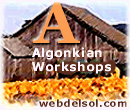Learn More
About Algonkian


|
| |
 |


New and Established Writers Welcome Phone: 1-800-250-8290 Phone: 1-800-250-8290
Literary and All Genres |


AF I is a model-method and context-based workshop, i.e., students create new works-in-progress in the context of the lesson environment, employing specific craft techniques and structure learned from a wide variety of accomplished writers. The goal of the workshop is to write work that will get published. Lessons, elements, and authors studied; exercises performed:
|
1. Pragmatism, The Art, and Publication |
 |
Satisfying the "art of fiction," obstacles to publishing, importance of subject matter, avoidance of cliché, story prep, story élan, what editors look for, long-term goals.
|
|

|
Exercise: Together with editor, students discuss concepts and strategize a personal approach to writing short fiction. Additional reading assignments. |
|
2. New Beginnings I |
 |
How to begin? Story sketching, irony, best non-fiction vs. fiction, seven criteria for choosing compelling subject matter, log lines and synopses, major complication.
|
Davies, Twain, Thompson, Butler |

|
Exercise: Students create two to three story outlines/concepts that meet select criteria. Next, students work with editor to write a prototype synopsis and log line. Additional reading assignments. |
|
3. New Beginnings II |
 |
Extreme titles, exploring narrative hooks, types of beginnings, bad prose, style must-knows.
|
Connelly, Painter, Lutz, Saroyan, Gogol, Kafka, Appolonius of Rhodes |

|
Exercise: Students brainstorm alternative story titles and experiment with opening narrative hooks, choosing one for the first story-in-progress. Additional reading assignments. |
|
4. Character, Craft, and Complication I |
 |
Tone props, understatement, character evolution, cause of predicament, triggers, empathy and sympathy, foreshadowing, scene construction, incident-based and character-based complication, tragic flaws, epiphany, resolution, types of narrative, story blocks, ripple-effect minor complications. |
Houston, Thompson, Johnson |

|
Exercise: Students focus on incident-base or character-base complication, match specific character, sketch character, and write one story block with scene using first-person POV. Additional reading assignments. |
|
5. Structure, Craft, and Theme |
 |
Analysis of methods available to create varying degrees of meaning and intellectual value when writing fiction. Variable 3rd Peson POV introduced.
|
TC Boyle, Thompson, Twain, Houston, O. Henry, Chekhov, Martone, Marquez |

|
Exercise: Students brainstorm and experiment with thematic applications, continuing to refine their first-person POV story-in-progress. Additional reading assignments. |
|
6. Character, Craft, and Complication II |
 |
Creating character relationships, poignancy in fiction, more variable third-person POV, using intra-story anecdotes to characterize, narrative vs. dialogue.
|
Leslie, Gomes, Maughm |

|
Exercise: Students transform their current story-in-progress into a 3rd person variable POV using technique learned in workshop. Additional reading assignments. |
|
7. Character, Craft, and Complication III |
 |
Verisimilitude, setting + details, the exotic character sketch, sympathy for rare personalities |
Ducornet, Butler, Marquez |

|
Exercise: In the context of the second story-in-progress, students explore types of "exotic" characters and further refine 3PPOV. Additional reading assignments. |
|
8. Structure, Craft, and Tension |
 |
Incident-based (character neutral) complications and focus-of-tension fiction sans major complications. |
Davies, Carver, Connelly |

|
Exercise: If not yet accomplished, students create an incident-based complication and/or a proto-synopsis for a focus-of-tension short story. Continued refinement of story-in-progress. Additional reading assignments. |
|
9. Prose Narrative Technique |
 |
Prose drills, prose description guide, delayed cognition, associative triggers, time-spatial jumping, variable tense, narrative élan checklist, the "art of fiction" spectrum. |
Phillips, West, O'Connor, Shatnoff, Plath, Proulx, Johnson |

|
Exercise: students given select exercise in the context of their second story-in-progress designed to enhance narrative as appropriate and necessary. Additional reading assignments. |
|
10. The Final Stories |
 |
Publication, revision without tears, the "art of fiction" test, summary discussions re structure and narrative. |
|

|
Exercise: Students further refine their work-in-progress, receiving editorial comment and line editing assistance as appropriate. Publication explored. |
= TOP OF PAGE = |
Web del Sol/Algonkian Workshops
2020 Pennsylvania Ave., NW
Suite 443
Washington, D.C. 20006
algonkian@webdelsol.com
Phone: 1-800-250-8290
|
|




